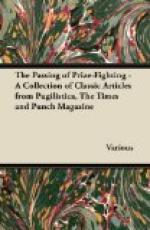George. I must ask you, Mamma, before we talk of anything else, whether Withsak and Alldane were beheaded?
Mrs. M. No; you will be relieved to hear that, although ALFRED was greatly incensed against them and had resolved to proceed to the enforcement of the extreme penalty, they were rescued by the intervention of the Archbishop of Canterbury and afterwards granted a free pardon on condition of abstaining from all participation in public life. This magnanimity on the part of ALFRED is all the more praiseworthy as many people firmly believed that these two princes had attempted to poison him, and that they were responsible for all the calamities which had befallen England from the invasion of JULIUS CAESAR, and which were destined to befall her till the end of time. Indeed a writer in an old saga, known as the Blackblood Saga, went so far as to maintain that the English climate had been permanently ruined by the incantations of Prince Alldane. Undoubtedly his name was an unfortunate one at the time, but, to judge by the old portraits I showed you, neither of these princes looked capable of such atrocities, and Prince Alldane was described as being the essence of rotundity.
Richard. Did not ALFRED invent the quartern loaf?
Mrs. M. Yes; before his time the nobles lived exclusively on cake and venison, while the peasantry subsisted on herbs and a substance named woad, which was most injurious to their digestions. ALFRED, who among his many accomplishments was an expert baker, himself gave instructions to the wives of the poor, supplied them with flour, the grinding of which was carried out in mills of his own devising, and insisted that all loaves should be made of a certain quality and size, with results most beneficial to the physique of his subjects. The story of his quarrel with the woman who would insist on baking cakes illustrates the difficulties he encountered in effecting his reforms.
Mary. Was not ALFRED called “England’s Darling”?
Mrs. M. Yes, my dear, and no wonder. Before his time there were no proper newspapers, the few issued being of high price and written in an elaborate style which only appealed to the highly educated. ALFRED changed all this, and insisted that they should be written in a “simple, sensuous and passionate style.” This was one of the causes of his falling out with Withsak, who supported the old-fashioned methods, while ALFRED was in favour of simplicity and brevity. You will find all this related in the work of Leo Maximus, a learned writer, the friend and admirer of ALFRED and author of his Life.
George. How much I should like to read it.
Mrs. M. You would find in it some inspiring and interesting particulars of ALFRED’s conversations and private life.
Mary. How many things ALFRED did! I cannot think how he found time for them all.
Mrs. M. He found time by never wasting it. One-third of his time he devoted to religious exercises and to study, another third to sleep and necessary refreshment, and the other to the affairs of his kingdom. The benefits he bestowed on his country were so great and various that even to this day we hardly comprehend them fully, and some ungrateful people refuse to regard them as benefits at all.




